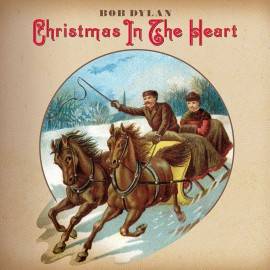 Why?
Why?
“Do you think he did it as a joke?”
“Is Dylan just recording these songs because he’s sentimental, or because he believes in the One whom Christmas celebrates?” one of the comments on the Amazon page asked.
“Bob Dylan and Christmas music go together like Liberace and bodybuilding.”
“He must really need the money” was a common response.
Nope. All proceeds for Bob Dylan’s Christmas in the Heart goes to Feeding America, the nation’s largest domestic hunger-relief charity, with “more than 200 member food banks that address hunger in all of its forms.”
Speaking for myself, Christmas in the Heart is, at heart, not that different from everything Bob Dylan has done and meant since he started out in Greenwich Village, a folk hero. The album may even be considered a return to his traditionalist roots, since it does not contain any original songs.
Ultimately, Christmas in the Heart is as subversive and surreal as all get out. It simply cannot be categorized.
Dylan’s 47th album thoroughly deconstructs Christmas. It merges the commercial and sacred aspects of the holiday seamlessly, blurring distinctions. Right from the first track, he sings about Santa and Jesus in the same heavy, raspy breath, making them virtually indistinguishable characters. He sings in Latin, as though thumbing his nose at the Vatican. He sings songs celebrating peace in lands where there hasn’t been peace in generations.
All of this is not to say Christmas in the Heart is listenable. It takes a staunch stomach and ears of steel to make it through this. The backup singers may be saccharine, but Dylan’s own voice is the polar opposite, as grating as the whack wino caroling in the alley. Dylan still is interested in blowing your mind in the wind. Every song demands a different take, a double take, a reassessment.
The first track, “Here Comes Santa,” does not differentiate between the sacred and the profane. As the lyric states, “Peace on earth will come to all if we just follow the light; let’s give thanks to the Lord above that Santa Claus comes tonight.” That’s just weird. But it also reminds me of Allen Ginsberg’s ecstatic Footnote to Howl, in which he declares everything to be holy (“The world is holy! The soul is holy! The skin is holy! The nose is holy! The tongue and cock and hand and asshole holy! Everything is holy! Everyman’s an angel! The bum’s as holy as the seraphim!”) Santa, Jesus… what’s the difference?
It also makes me wonder about mortality, for some reason. Will people listen to this album 100 years from now? 50 years? 20 years? Will they think of Mrs. Miller and Tiny Tim and laugh? Or will they file it as a classic along with others who have performed this song — Gene Autry, Elvis, and Bing Crosby? Dylan has long claimed to be nothing more than a troubadour, a song-and-dance man. This album fits right in.
“I’ll Be Home for Christmas” comes across more as a threat than a promise. His voice makes the song sound like the relative you don’t want anywhere near the children during the holidays. But it also reminds me of the ongoing wars and those who will and who won’t be returning for Christmas this year. This song is the first hint that Dylan’s early years of war protest haven’t entirely disappeared.
I had to look up the lyrics of “Must Be Santa” just to make sure Dylan hadn’t inserted some satiric verses of his own. But there they are, the names of the presidents, quite clearly listed in the sing-along kiddie song, “Dasher, Dancer, Prancer, Vixen, Eisenhower, Kennedy, Johnson, Nixon. Dasher, Dancer, Prancer, Vixen, Carter, Reagan, Bush, and Clinton. Reindeer sleigh, come our way, Ho, ho, ho, cherry nose, Cap on head, suit that’s red, Special night, beard that’s white… Must be Santa, must be Santa, Must be Santa, Santa Claus.”
With politics, Jesus, war, and commercialism addressed, this might be the most political album Dylan has made in years.
“O Come All Ye Faithful” is another of the religious songs, here sung in Latin.
“The First Noel” speaks of peace and the king of Israel. That makes sense in terms of Christmas, but given Dylan’s Jewish roots and the state of peace in Israel today, it starts to sink in that maybe all this singing about the Prince of Peace is just a little bit tongue-in-cheek.
The album concludes with the sweet Christmas hymn “O Little Town of Bethlehem,” which pushes home the reminder about the lack of peace in the Middle East and the irony of Christmas in America. The last word he sings on the album is an extended “Amen,” which — I must say — gives me shivers and I’m not exactly sure I can say why. It’s just so complicated.
How does one effectively protest for peace these days? Dylan is the only person I know who is capable of expressing irony and sarcasm without ever openly revealing either one. He could be completely sincere. But I doubt it. Ask him if he had even the least political intention in this album and he is most certain to deny it, just as he denied his political aims in the trickster, mad-hatter days of Don’t Look Back in England.
Dylan, intentionally or not, makes us squirm, really squirm. He makes us see our hypocrisy in celebrating consumerism and the facade of peace while bombs continue to explode in Iraq and people here and around the world go hungry. He does this without ever really pointing it out. His very voice makes us uneasy. We haven’t heard these Christmas songs so fresh — in many senses of the word — in years.
So, why did Bob Dylan really make a Christmas album? The answer, my friend, is… well, you know.








